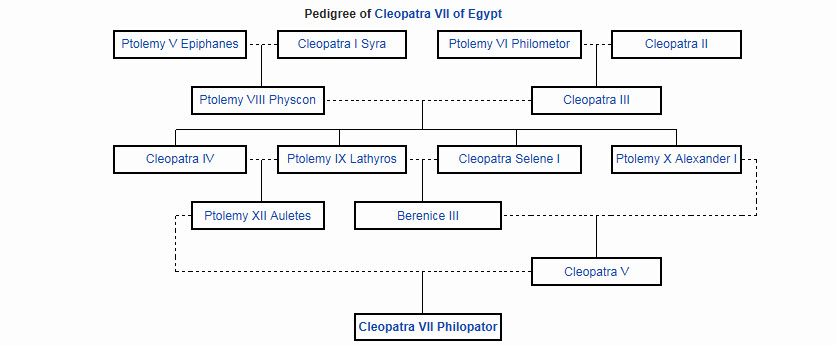I am trying to refer to a number of ancestors in two ways, and I need two terms or even two adjectives for "ancestors" that will distinguish one from another.
The case I am interested in is where there is pedigree collapse, where one person is an ancestor of the proband in multiple ways.
For example, the following simple pedigree of Cleopatra (from Wikipedia)
The diagram identifies 13 ancestors.
In genealogy, the typical method of denoting ancestors is through a pedigree chart, where each generation of the chart shows both parents for each person of the previous generation and thus always grows in a binary manner, with 1, 2, 4, 8, 16, ... ancestors listed at each generation. Of course, not all the ancestors are always known and some of the ancestors may repeat.
So the above Cleopatra tree will then be shown as:
- Ptolemy V Epiphanes
- Ptolemy VIII Physcon
- Cleopatra I Syra
- Ptolemy IX Latyros
- Ptolemy VI Philometor
- Cleopatra III
- Cleopatra II
- Ptolemy XII Auletes
- Ptolemy V Epiphanes
- Ptolemy VIII Physcon
- Cleopatra I Syra
- Cleoptra IV
- Ptolemy VI Philometor
- Cleopatra III
- Cleopatra II
- Cleopatra VII Philopator
- Ptolemy V Epiphanes
- Ptolemy VIII Physcon
- Cleopatra I Syra
- Ptolemy X Alexander I
- Ptolemy VI Philometor
- Cleopatra III
- Cleopatra II
- Cleopatra V
- Ptolemy V Epiphanes
- Ptolemy VIII Physcon
- Cleopatra I Syra
- Ptolemy IX Latyros
- Ptolemy VI Philometor
- Cleopatra III
- Cleopatra II
- Berenice III
- Ptolemy V Epiphanes
- Ptolemy VIII Physcon
- Cleopatra I Syra
- Cleopatra Selene I
- Ptolemy VI Philometor
- Cleopatra III
- Cleopatra II
This shows 38 ancestors, but there are only 13 individuals, many of whom are repeated multiple times due to the inbreeding.
My question is I want to refer to the two different counts of ancestors. So what would be the best terminology to use to say:
I have 13 __________
I have 38 __________

